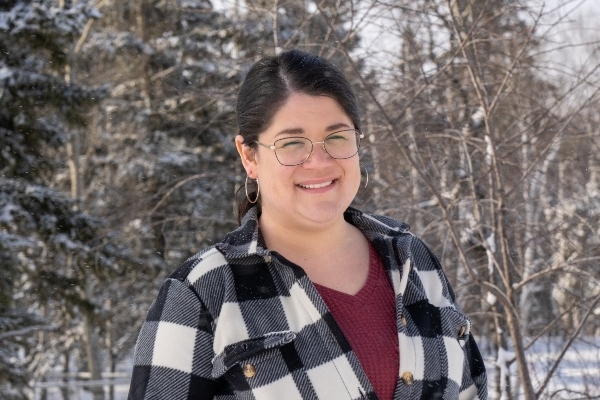
Leading a new generation in Indigenous governance
Indigenous governance and the issues surrounding it are an ingrained part of Billie Natomagan’s life.
By Scott Larson for JSGSShe’s seen first-hand the barriers faced by Indigenous peoples on many levels. Natomagan taught for a decade in northern communities such as her hometown of Beauval, Jans Bay, and her current home in Pinehouse Lake, Sask.
Natomagan says it was enraging teaching Native studies programs that hadn’t been updated since the early 1990s.
“So much has happened with the Indigenous community since then,” she says. “But I realized that pounding on tables could only get me so far in terms of advocating for my Indigenous children. “It was that disappointment with the education system that fuelled me to want to go into leadership to eventually be able to talk to decision-makers and lobby not only for my children, but my people.”
That has led her to the Johnson Shoyama Graduate School of Public Policy’s (JSGS) Joint Master of Governance and Entrepreneurship in Northern and Indigenous Areas (GENI) program.
Natomagan actually began the GENI program 10 years ago but then decided it wasn’t the right time to pursue a master’s degree. Then in 2019, she ran successfully in municipal elections and became deputy mayor of Pinehouse Lake.
“Then I went on maternity leave and while I was away, I started to get more involved in local politics and I realized that was my passion and I wanted to be involved in leadership development and self-governance,” said Natamagan.
In 2021, Natomagan took a leap of faith, changing careers by beginning work at the Kineepik Metis Local as the Environmental Coordinator.
“I quit teaching and took a risk,” she said. “But working for this local Indigenous organization I realized I loved it.”
Within two years, she was promoted to Executive Director.
“Since I’m living and breathing Indigenous governance I thought it was a great time to go back (to the GENI program),” Natomagan said.
Her focus is on institutional barriers created by the different levels of government.
“We live in an Indigenous community in Pinehouse Lake and one of the largest barriers to service delivery and program delivery is the definition of ‘Treaty’ and ‘Métis’, and how we can only help Métis with this program, and we can only help First Nations children with this program,” she said.
“This causes a lot of division within the community, so I want to focus on these intentional barriers and how external definitions of Indigeneity hinders the development of governance and efficacy within our communities.”
Natomagan says she is working toward reclaiming her own Indigenous language and culture thanks to my husband, who is a Treaty, fluent Cree speaker.
“I am also an avid land user and spend my free time enjoying the outdoors,” she said. “I enjoy harvesting medicines, blueberries, small game (rabbits, ducks, grouse) and big game hunting. I have my boating licence and can be found on the lake when I am not working. I spend many weekends on the boat, sea doo, quad, or skidoo and enjoy all seasons.”
Natomagan has one more class to complete before focusing on her research paper, which will be tailored toward governance.
“I want to focus on division within Indigenous communities and how do we overcome those barriers,” she said.
Her job at Kineepik Métis Local is to support the Métis people of Pinehouse Lake, but they have chosen to be status blind.
“We are going to help all citizens of our community, regardless of Métis or First Nations,” Natomagan said. “As Indigenous people we take on these big fights, but we avoid the one right in front of us, which is those legal definitions. This is unacceptable and needs to change. For example, child jurisdiction, which is one of the areas I’m thinking of focusing on, [dictates that] First Nations kids get sent to different communities than Métis kids. And because of the different institutes that govern those child jurisdictions we have no community control over where our children land.”
Natomagan has intimate knowledge of the two systems through her four children.
“I have two daughters who are Métis and now I have a son and daughter who are Treaty,” she said. “It is so infuriating that my other two children get different services than my younger two. But rather than complain, I must act.”
Natomagan said having her GENI masters gives her the expertise to pursue those goals of equal access for all.
“I have such a supportive family – my mother also has her GENI masters – there is no limit,” Natomagan said. “I want to run for every office possible. To lobby, advocate, set a fire throughout the north and encourage others to do the same.”
And she’s optimistic that change is around the corner.
“I feel like the ground is ready. People have been ploughing and ploughing to create change and I feel we are right at the cusp of it,” she said. “The generation behind me, we owe it to them that change happens in their lifetime.”

